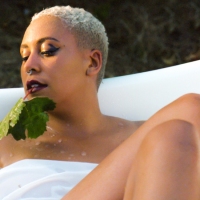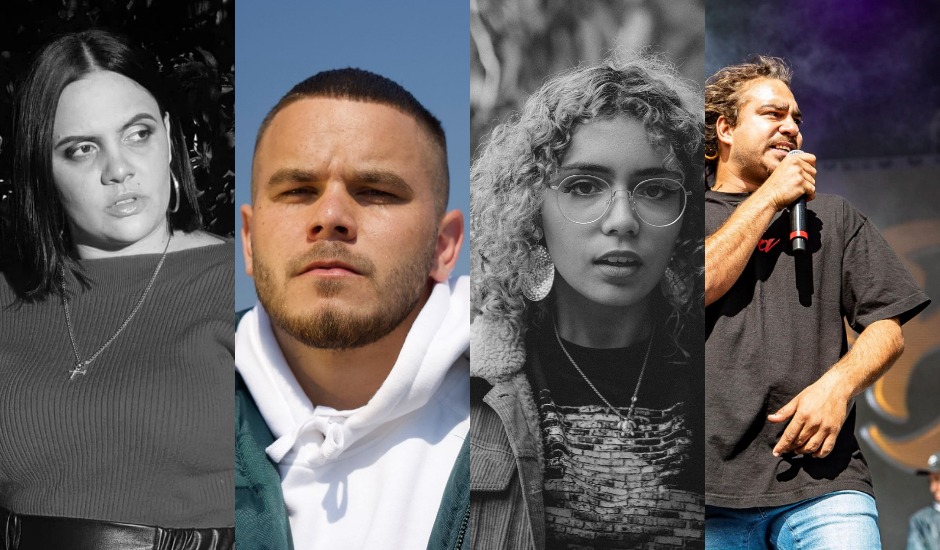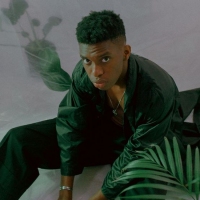 Premiere: Jamilla is at her most stripped-back and raw with new single, Love HimselfThe hazy, guitar-backed tune is a nod to her older sounds, and the emotive punch that lingers in her music to this day.
Premiere: Jamilla is at her most stripped-back and raw with new single, Love HimselfThe hazy, guitar-backed tune is a nod to her older sounds, and the emotive punch that lingers in her music to this day.

Meet the Indigenous musicians leading Australia's hip-hop and soul future
Composed of a mix of both familiar and newcoming names, it's clear that the future of Australian hip-hop has never been brighter.
There are no shortage of lists out there summarising the plethora of Indigenous talent within Australia, but they're never updated to include the constantly-growing scene that's bursting across the country. We've said time and time again that Australia's hip-hop world is the strongest it's ever been, and that a big reason for that is the next generation of acts pushing it into new directions, whether they're names we talk about on a near-weekly basis, right through to those giving specific areas like West Australia a distinctly unique edge.
One area that's often overlooked, however, is the Indigenous musicians that have always led Australia's hip-hop world, and the ones that are bound to pave these pathways in future years, too. Since the 1980s, Indigenous Australians have been using hip-hop as a vessel for conversation, with talent scattered throughout the decades following still feeling present in 2020, whether it's simple nods as influences and inspiration, or through generational passing (Tasman Keith's father, for example, is Gumbayngirri rapper Wire MC.
Of course, there have been artists that have burst through into commercial success. There's no denying that AB Original is one of Australia's most celebrated groups, and both Briggs and Trials - the pair's two members - visible within Australian hip-hop through their solo projects too. In the past two years, there's been the rise of Baker Boy - recognised for his seamless intertwining of English and Yolngu Matha - and in more soulful and R&B-aligned worlds, the blossoming of musicians like Kaiit, Mo'Ju and Miiesha, three acts we've constantly covered across the last few years, and three acts whose imprint of Australian R&B is sure to be recognised for years and years to come.
However, there's a whole other new generation on the rise, encouraging one another to soar and thrive within Australian hip-hop and R&B, ensuring that the future is as Indigenous as they can be and that the stories these musicians have to share are continued to be passed down as time goes on. There's something really special in the whole movement - as well as these musicians themselves - and as the world moves to finally celebrate talent like the collection of artists below, there's no better time than now to educate yourself and learn who are the acts of the future, and what do they have to say.
So, without further ado, here are eight Aboriginal and Torres Strait Islander musicians paving future paths in the country's hip-hop and R&B worlds, and why you should be paying attention to them:
Dallas Woods
Starting from the top, it'd be a near-crime to name Dallas Woods anything but the future of Australian hip-hop. As a Noongar man raised in the East Kimberley of West Australia but now based in Melbourne, the rapper has proved an explosive force in Australian hip-hop ever since his introduction, consistently striving from strength to strength both in touring - he toured the country with Baker Boy, and was named one to watch in Australian rap in the midst of this spotlighted tour - and in release form, where he marked a comeback at the tail-end of May with If It Glitters It's Gold.
If It Glitters It's Gold is the perfect example of Dallas Woods' brilliance in hip-hop, who uses quick-firing verses and an upbeat and lively production by Jerome Farrah - a longtime collaborator of Dallas Woods over the years - as a vessel for lyricism on the glitz and glamour of the music industry, and how everything isn't quite as it seems: "We live in a world where we’re told ‘bigger is better’ and every day is a reminder of just how much we want to outdo the person next to us," he says. "I wanted to be as big, if not bigger, than people who inspire or paved the way for my journey. But that goes against my morals. And in doing that I realised just how much energy it takes to maintain an ego."
Kee'ahn
There's something remarkably special about Kee'ahn. The Gugu Yalanji, Jirrbal and Badu Island 22-year-old is a voice of the future, with her silky vocal and sharp lyricism nestling themselves a home amongst woozy productions that wash over you like a comforting rug; smatterings of jazz and funk weaving themselves in and out of her soulful, R&B-aligned vocal. Her debut single Better Things, for example, speaks of the feeling of not fitting in to a new home, and the sensation of homesickness that spurs so many Indigenous musicians who move to capital cities like Melbourne - where Kee'ahn now resides - in search of success.
"I wrote Better Things when I was going through a hard time; a relationship and emotional breakdown, homesickness in a faraway city – an overwhelming feeling of being lost and alone," she explains. "This song is about being grateful for what I have, looking towards the future and having hope." You can hear that slither of hope through Kee'ahn's vocal on Better Things and through her honeyed vocal and swaying beats, Kee'ahn's music is likely to make you feel hopeful too.
Ziggy Ramo
Ziggy Ramo is a familiar face to those that have been reading Pilerats for a long time now, with the rapper - whose spread his wings across much of Australia, from Arnhem Land in the North through to Sydney, where he now resides - consistently being a heavyweight in Australian music since his first introduction. It's not too hard to work out why either, with his music being some of the most crucial - and incredible - to Australian hip-hop in the past few years, while he constantly uses his platform to educate and inspire the next generation of Ziggy Ramo's, something we think Kehlani - one of Ziggy's biggest fans - would be incredibly excited to see.
Time and time again, Ziggy Ramo has impressed us. His work is always fierce and focused, exploring the intersection of themes like masculinity, power, blackness and more through bustling vocals that always stand out from the crowd, and never fail to win us over. He's been quiet for a little while now, but those who have been keeping an eye on him would know that there's new music in the pipeline, with tracks like Smile - which sneakily may have been uploaded to triple j Unearthed earlier this week - showing his strengths aren't disappearing some four years into his career.
MissGenius
Those in tune with the West Australian hip-hop scene should have hopefully come across MissGenius already. The Maduwongga and Noongar woman from West Australia has become an important and overdue new addition to Perth's often-male-dominated hip-hop world, with tracks throughout the last two years building on her life experiences and forming tracks that aim to strengthen and inspire those who see themselves in MissGenius - a part of her music that'll never disappear regardless of whether she's experimenting with rap, R&B or other pockets of music.
MissGenius isn't just in it as a rapper, however. She's constantly booked and busy at festivals around the state as both a performer and a speaker, while also working as a public speaking and confidence coach for young indigenous women through the Goolarri Media program and youth mentoring through Australian Indigenous Mentoring Experience (AIME). MissGenius can do everything.
Tasman Keith
Tasman Keith is unstoppable, and everyone in music will be sure to tell you the same thing. As the son of Gumbaynggirr trailblazer Wire MC, Tasman Keith's place in Australian hip-hop was always set in stone, but the last few years have proved that his place is well-earnt too, with the Bowraville rapper constantly releasing cutting-edge hip-hop that isn't afraid to tackle some of the bigger issues in his life, from stories of his father - My Pelopolees - through to the musical horror that goes deep into his life and the experiences he's had over the years.
Kobie Dee
Gamilaroi rapper Kobie Dee is soon going to be a name on everyone's lips. Since his arrival in 2018, Kobie has consistently found his place in sharp lyricism and rich storytelling, with everything he's put out welcoming us deeper into his world and educating us on someone who's sure to be a defining name of Australia's hip-hop future. His new single Still Standing, however, is his most eye-opening to date, with Kobie at his most heartfelt and open as he details the struggles of him and his community as Indigenous Australians.
"The first verse I actually wrote in 2016 after invasion day, and the second I finished at the beginning of this year," he says on the track. "The song is about the Stolen Generation and some of the issues that we face as Aboriginal people. My great grandfather was taken from his parents in Wreck Bay. I personally couldn’t imagine how much that would have hurt to be taken from your parents and away from your culture. It is something that makes me sad when I look at my daughter because I couldn’t live if I had her taken from me."
Lady Lash
Kokatha musician Lady Lash is one the older fans of Australian hip-hop would recognise, with the rapper boasting a discography that stretches throughout much of the last decade. Over the last few years particularly, Lady Lash has blossomed into a go-to essential of Australian hip-hop and R&B, both on the live stage - where she's played the Sydney Opera House and performed alongside Paul Kelly and Archie Roach - and in recording, where albums-worth of songs see her never fault and back down. She's been relatively quiet for much of the last year or two, but never fear - Lady Lash will be back, and when that happens, you're sure as hell going to know about it.
Birdz
Rounding it off is Birdz, someone else whose next move we're eagerly awaiting. As a vital member of the blossoming Bad Apples crew, Butchulla rapper Birdz is an essential to Australian hip-hop and will be for years to come, with every release he's put out since 2013 seeing the musician level up and grow stronger - something that we can see continuing on and on in years to come, with no end in sight. His work is both lively and animated, yet deep with meaning and lessons learnt by Birdz over his decade-long span as one of the country's most consistent rappers.
Take last year's Place Of Dreams, for example. Featuring Ecca Vandal, the track feels like a joyous and bright hip-hop track on its surface, only for its rich lyricism to be pointed and focused, discussing the glass ceiling particularly in place for Indigenous musicians like Birdz. "Ultimately, Place Of Dreams is about believing in yourself, having the strength to break through the bullshit and continue paving your own path," he says. We're not too sure what his next move is, but rest assured, it will be great.
In the light of the current events, consider donating to one of the many charities and/or centres that ensure the protection and well-being of Indigenous people, which you can find in a Google Sheet put together by Kira Puru here.
 Premiere: Jamilla is at her most stripped-back and raw with new single, Love HimselfThe hazy, guitar-backed tune is a nod to her older sounds, and the emotive punch that lingers in her music to this day.
Premiere: Jamilla is at her most stripped-back and raw with new single, Love HimselfThe hazy, guitar-backed tune is a nod to her older sounds, and the emotive punch that lingers in her music to this day.
 Album Walkthrough: Stevan goes deep on his debut mixtape, Just KidsWith his debut collection of tracks, the rising Wollongong musician captures the nostalgia of growing up through woozy indie-R&B.
Album Walkthrough: Stevan goes deep on his debut mixtape, Just KidsWith his debut collection of tracks, the rising Wollongong musician captures the nostalgia of growing up through woozy indie-R&B.